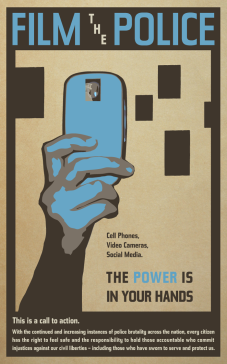Document
 Write down a detailed summary of what unfolded. It’s important to tackle this step while the incident is fresh as details that are now clear will become hazy with the passage of time.
Write down a detailed summary of what unfolded. It’s important to tackle this step while the incident is fresh as details that are now clear will become hazy with the passage of time.
Your goal is to have piece of content that when read by someone unfamiliar with the incident, they’ll have a clear understand of pertinent information like the date and time, the location of the interaction, the names of those involved involved, what preceded the interaction, what what communicated or claimed during the interaction, and where things now stand.
If you have supporting documentation like police reports send them to United Against Police Terror THROUGH OUR UAPTSD.ORG’S LEO MISCONDUCT COMMUNITY COMPLAINT FORM
Disseminate
The more others know about your situation the better. It will not only focus attention on the individual who acted in the wrong but pressure the prosecutor or police outfit to drop any charges unjustly levied at you. Those folks rely on legitimacy and the court of public opinion is powerful!
You can do this via text or video.
If text, it’s very likely that you can just use the detailed write-up – either as-is, or modified a little bit. Let a friend read your recount. Ask them what is unclear and fill in those questions in.
If video, you can use your detailed write-up as a reference. Sit down in front of your webcam or other recording device and give a narrative of what happened. Depending on your skill level, software, and need, you can choose to edit the video. Once completed, upload it to your YouTube channel or another video-hosting site such as United Against Police Terror – San Diego Uaptsd.org
Note that some people opt-not to make-public their entire incident (the raw footage, for example) as police employees have been known to rewrite reports to better-match the objective facts portrayed via video. If this is a concern, you could obtain the police report prior to making live the related footage, so you’ll have that copy in case a new one is later presented.
Other Tactics
File a Freedom of Information Act (FOIA)
Work to obtain all the documentation the police have about your situation. The more such information you have the more-likely lies and omissions made by “the authorities” will be seen, say between two police reports filed by two different individuals about the same incident. Also, if say, video surveillance is gotten, your story can be objectively supported.
A FOIA request doesn’t have to be fancy. You can write a request using a pen on a regular piece of paper. Include a sentence or two overview of who you are, the information sought, and your contact information.
Connect & Collaborate with us
The more support you have on the ground the better.
If there are others in your area connect with them as those active may be willing and able to assist sharing content online, making calls, doing outreach, or accompanying you when filing your FOIA or if you venture into legal land.
If you are able to ascertain the home address of the police employee who wronged you, give those in the neighborhood a heads-up on the caliber of their neighbor.
Print out a couple-sentence overview and the link to your piece of content online, and stop by the homes of neighbors. If they’re not present, leave the handout between their doors. If they are home, be considerate of their time and recognize that this tactic (going door to door) isn’t often done so it’s important to be on-point. Introduce yourself, inform them that you won’t take much of their time but just wanted to them you aware of a situation involving one of their neighbors, point out that were you to live next to someone who acted aggressive toward others you’d want to know, give a very brief overview of your situation, hand them the print-out, encourage them to check out your more thorough write-up or view when they have time ,and to reach their own conclusions and act accordingly.
Inform Area Media
Without question, corporate media outlets often just parrot whatever police employee spokespeople tell them about incidents, but since you’ve already done the work (the write-up or video), you might as well make them aware.
Visit the media website and use the submission form or find the email address most appropriate to share about your situation. The easier it is for them to get up-to-speed the more likely it is to be covered. Provide an informative summary your contact information, and the link to your video or the text from your more thorough write-up, and any objective documentation to support your claims.
Filing a Police Complaint
There are many ways to do this
Filing a complaint with KAMALA D. HARRIS, ATTORNEY GENERAL DEPARTMENT OF JUSTICE in the State of California
CALIFORNIA DEPARTMENT OF JUSTICE POLICY GOVERNING CITIZEN COMPLAINTS AGAINST LAW ENFORCEMENT FORM
Mail Form to: Public Inquiry Unit Office of the Attorney General P.O. Box 944255 Sacramento, CA 94244-2550
PURPOSE This general policy establishes guidelines governing the manner in which the Department of Justice will respond to complaints by members of the public against a law enforcement agency or its employees.
GENERAL POLICY It is the Department of Justice general policy that local government will be primarily responsible for citizen complaints against law enforcement agencies or employees of law enforcement agencies, and that appropriate local resources (e.g. sheriff or police department, district attorney, citizens review commission and/or grand jury in the area of jurisdiction) be utilized for resolution of such complaints prior to a request for intervention by the Attorney General. The Attorney General will review citizen complaints against a law enforcement agency or its employees for possible investigation when substantive allegations of unlawful conduct are made and all appropriate local resources for redress have been exhausted, or when the local district attorney is the subject of the complaint.
ADMINISTRATION OF GENERAL POLICY All complaints against law enforcement agencies or employees of those agencies will be initially processed and reviewed by the Attorney General’s Public Inquiry Unit (PIU). To expedite processing and ensure accuracy, all complaints must be submitted to the PIU in writing. Those which do not meet the policy criteria above will be responded to by the Public Inquiry Unit. This response will inform complainants of the appropriate local resources to be contacted for resolution of complaints and/or request clarifying information as needed. Complaints appearing to meet the aforementioned policy criteria will be immediately forwarded by the Public Inquiry Unit for acknowledgment and handling to both the Senior Assistant Attorney General, Criminal Law Division (CLD), in the area having geographical jurisdiction and also to the Senior Assistant Attorney General of the Civil Rights Enforcement Section (CRES) of the Division of Public Rights. Both recipients of the complaint shall confer, as often as is necessary or prior to any action, to both keep each other informed about developments in their respective evaluations and also to coordinate investigative or litigation activities. All proposed legal actions (i.e. the filing of criminal charges or civil litigation) must be reviewed and approved by the Chief Deputy Attorney General for Legal Affairs. Where appropriate and requested by the CRES and/or the CLD, the Division of Law Enforcement shall provide investigative assistance. Questions regarding the guidelines that govern responses to citizen complaints against law enforcement agencies and/or personnel of those agencies should be directed to the Public Inquiry Unit at (916) 322-3360 or toll-free (800) 952-5225.
As per the SDPD Website, they recommend one or more of the following methods:
By telephone or in writing to the Chief of Police: Shelley Zimmerman
1401 Broadway, MS 700, San Diego, CA 92101(619) 531-2777
sdpdpolicechief@pd.sandiego.gov
By telephone or in writing to the Internal Affairs Unit:
1401 Broadway, MS 709, San Diego CA 92101
(619) 531-2801
To the Office of the Mayor, City of San Diego, 202 C Street, San Diego CA 92010
In person, by telephone or by writing to the Citizen’s Review Board on Police Practices: 202 C Street, MS 9A, San Diego CA 92101
(619) 236-6296 citizensreviewboard@sandiego.gov
Download CRB Complaint form here
By the Chief’s Confidential Telephone Recorded Hotline at (619) 531-2672.
As per the San Diego County Sheriff’s Website, file a complaint online with The Citizens’ Law Enforcement Review Board (CLERB) or contact the Citizens’ Law Enforcement Review Board, 555 W Beech Street, Suite 505, San Diego, CA 92101-2940, Phone: (619) 238-6776, Fax: (619) 238-6775, E-mail: clerbcomplaints@sdcounty.ca.gov
***IMPORTANT*** We as United Against Police Terror Strongly suggest you follow up an ACLU of San Diego and Imperial Counties for further assistance.
Working through internal police mechanisms, such as filing a complaint, very rarely results in any substantive outcome – after all, it’s “investigated” by someone who’s a friend, or at least, a colleague, of the aggressor – but some encourage this tactic be pursued if only to create a paper trail and tie-up police resources.
Also, if making public an interaction you had with a police employee, the fact that you may be able to point-out that a dozen (or more) other complaints have already been lodged against him or her, it can help demonstrate their record of not being too professional.
Police complaints can sometimes be filed through the website of the police outfit where the police employee works. If so, fill-out the form (perhaps using some or all of your write-up about the event already done, or pointing to the URL where your write-up can be found online). Alternatively, call or visit the police outfit to learn their process – if you do that, be sure to film as those seeking to file complaints are sometimes questioned or harassed.
Whatever method you utilize, be sure to get a receipt of some kind – a print-out from the online interface, or a signature/stamp if done in-person. And inquire about the timeline expected – is there a mandatory response within a week? A month?
Learning Through Struggle
Consider too that publishing the story is a way that you can inform those at the police outfit that others have been made aware of the situation – if it’s online, or if you’ve contacted the media, for example, that’ll put more pressure on them to not further compound the wrongs already committed.
Incidents like the one you experienced are are now seeking remedy for will continue to occur until the Institution itself is dismantled. That is happening: Want to End Police Brutality? Focus on the Institution











